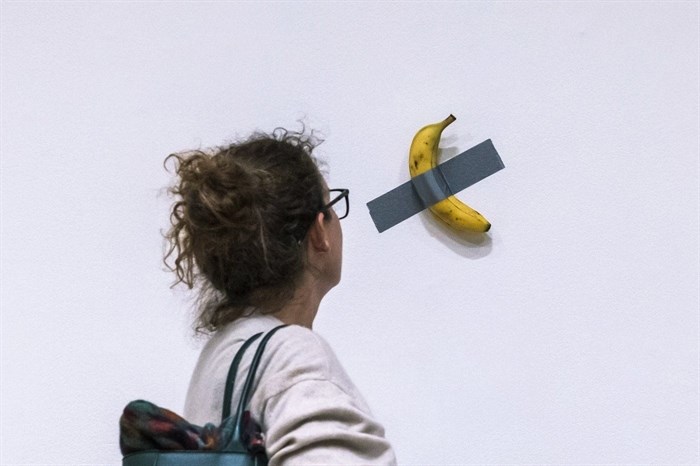
File - A woman looks at artist Maurizio Cattelan's piece of art "Comedian" during an auction preview at Sotheby's in New York, Monday, Nov. 11, 2024.
Image Credit: (AP Photo/Eduardo Munoz Alvarez, File)
November 18, 2024 - 9:00 PM
NEW YORK (AP) — Walk into any supermarket and you can generally buy a banana for less than $1. But a banana duct-taped to a wall? That might sell for more than $1 million at an upcoming auction at Sotheby’s in New York.
The yellow banana fixed to the white wall with silver duct tape is a work entitled “Comedian,” by Italian artist Maurizio Cattelan. It first debuted in 2019 as an edition of three fruits at the Art Basel Miami Beach fair, where it became a much-discussed sensation.
Was it a prank? A commentary on the state of the art world? Another artist took the banana off the wall and ate it. A backup banana was brought in. Selfie-seeking crowds became so thick, “Comedian” was withdrawn from view, but three editions of it sold for between $120,000 and $150,000, according to Perrotin gallery.
Now, the conceptual artwork has an estimated value of between $1 million and $1.5 million at Sotheby's auction on Nov. 20. Sotheby's head of contemporary art, David Galperin, calls it profound and provocative.
“What Cattelan is really doing is turning a mirror to the contemporary art world and asking questions, provoking thought about how we ascribe value to artworks, what we define as an artwork," Galperin said.
Bidders won't be buying the same fruit that was on display in Miami. Those bananas are long gone. Sotheby’s says the fruit always was meant to be replaced regularly, along with the tape.
“What you buy when you buy Cattelan’s ‘Comedian’ is not the banana itself, but a certificate of authenticity that grants the owner the permission and authority to reproduce this banana and duct tape on their wall as an original artwork by Maurizio Cattelan,” Galperin said.
The very title of the piece suggests Cattelan himself likely didn't intend for it to be taken seriously. But Chloé Cooper Jones, an assistant professor at the Columbia University School of the Arts, said it is worth thinking about the context.
Cattelan premiered the work at an art fair, visited by well-off art collectors, where “Comedian” was sure to get a lot of attention on social media. That might mean the art constituted a dare, of sorts, to the collectors to invest in something absurd, she said.
If “Comedian” is just a tool for understanding the insular, capitalist, art-collecting world, Cooper Jones said, “it’s not that interesting of an idea.”
But she thinks it might go beyond poking fun at rich people.
Cattelan is often thought of a “trickster artist,” she said. “But his work is often at the intersection of the sort of humor and the deeply macabre. He’s quite often looking at ways of provoking us, not just for the sake of provocation, but to ask us to look into some of the sort of darkest parts of history and of ourselves.”
And there is a dark side to the banana, a fruit with a history entangled with imperialism, labor exploitation and corporate power.
“It would be hard to come up with a better, simple symbol of global trade and all of its exploitations than the banana,” Cooper Jones said. If “Comedian” is about making people think about their moral complicity in the production of objects they take for granted, then it's “at least a more useful tool or it’s at least an additional sort of place to go in terms of the questions that this work could be asking,” she said.
“Comedian” hits the block around the same time that Sotheby's is also auctioning one of the famed paintings in the “Water Lilies” series by the French impressionist Claude Monet, with an expected value of around $60 million.
When asked to compare Cattelan's banana to a classic like Monet's “Nymphéas," Galperin says impressionism was not considered art when the movement began.
“No important, profound, meaningful artwork of the past 100 years or 200 years, or our history for that matter, did not provoke some kind of discomfort when it was first unveiled,” Galperin said.
Follow Julie Walker on X @jwalkreporter.
News from © The Associated Press, 2024